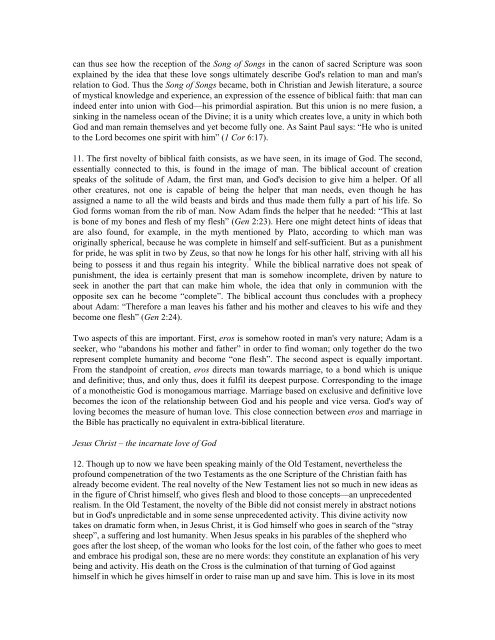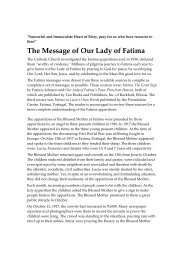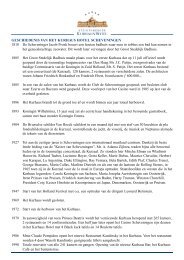God Is Love - Beeldbibliotheek
God Is Love - Beeldbibliotheek
God Is Love - Beeldbibliotheek
- No tags were found...
Create successful ePaper yourself
Turn your PDF publications into a flip-book with our unique Google optimized e-Paper software.
can thus see how the reception of the Song of Songs in the canon of sacred Scripture was soonexplained by the idea that these love songs ultimately describe <strong>God</strong>'s relation to man and man'srelation to <strong>God</strong>. Thus the Song of Songs became, both in Christian and Jewish literature, a sourceof mystical knowledge and experience, an expression of the essence of biblical faith: that man canindeed enter into union with <strong>God</strong>—his primordial aspiration. But this union is no mere fusion, asinking in the nameless ocean of the Divine; it is a unity which creates love, a unity in which both<strong>God</strong> and man remain themselves and yet become fully one. As Saint Paul says: “He who is unitedto the Lord becomes one spirit with him” (1 Cor 6:17).11. The first novelty of biblical faith consists, as we have seen, in its image of <strong>God</strong>. The second,essentially connected to this, is found in the image of man. The biblical account of creationspeaks of the solitude of Adam, the first man, and <strong>God</strong>'s decision to give him a helper. Of allother creatures, not one is capable of being the helper that man needs, even though he hasassigned a name to all the wild beasts and birds and thus made them fully a part of his life. So<strong>God</strong> forms woman from the rib of man. Now Adam finds the helper that he needed: “This at lastis bone of my bones and flesh of my flesh” (Gen 2:23). Here one might detect hints of ideas thatare also found, for example, in the myth mentioned by Plato, according to which man wasoriginally spherical, because he was complete in himself and self-sufficient. But as a punishmentfor pride, he was split in two by Zeus, so that now he longs for his other half, striving with all hisbeing to possess it and thus regain his integrity. 8While the biblical narrative does not speak ofpunishment, the idea is certainly present that man is somehow incomplete, driven by nature toseek in another the part that can make him whole, the idea that only in communion with theopposite sex can he become “complete”. The biblical account thus concludes with a prophecyabout Adam: “Therefore a man leaves his father and his mother and cleaves to his wife and theybecome one flesh” (Gen 2:24).Two aspects of this are important. First, eros is somehow rooted in man's very nature; Adam is aseeker, who “abandons his mother and father” in order to find woman; only together do the tworepresent complete humanity and become “one flesh”. The second aspect is equally important.From the standpoint of creation, eros directs man towards marriage, to a bond which is uniqueand definitive; thus, and only thus, does it fulfil its deepest purpose. Corresponding to the imageof a monotheistic <strong>God</strong> is monogamous marriage. Marriage based on exclusive and definitive lovebecomes the icon of the relationship between <strong>God</strong> and his people and vice versa. <strong>God</strong>'s way ofloving becomes the measure of human love. This close connection between eros and marriage inthe Bible has practically no equivalent in extra-biblical literature.Jesus Christ – the incarnate love of <strong>God</strong>12. Though up to now we have been speaking mainly of the Old Testament, nevertheless theprofound compenetration of the two Testaments as the one Scripture of the Christian faith hasalready become evident. The real novelty of the New Testament lies not so much in new ideas asin the figure of Christ himself, who gives flesh and blood to those concepts—an unprecedentedrealism. In the Old Testament, the novelty of the Bible did not consist merely in abstract notionsbut in <strong>God</strong>'s unpredictable and in some sense unprecedented activity. This divine activity nowtakes on dramatic form when, in Jesus Christ, it is <strong>God</strong> himself who goes in search of the “straysheep”, a suffering and lost humanity. When Jesus speaks in his parables of the shepherd whogoes after the lost sheep, of the woman who looks for the lost coin, of the father who goes to meetand embrace his prodigal son, these are no mere words: they constitute an explanation of his verybeing and activity. His death on the Cross is the culmination of that turning of <strong>God</strong> againsthimself in which he gives himself in order to raise man up and save him. This is love in its most












